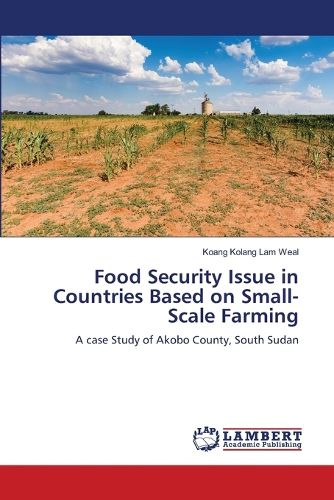Readings Newsletter
Become a Readings Member to make your shopping experience even easier.
Sign in or sign up for free!
You’re not far away from qualifying for FREE standard shipping within Australia
You’ve qualified for FREE standard shipping within Australia
The cart is loading…






This title is printed to order. This book may have been self-published. If so, we cannot guarantee the quality of the content. In the main most books will have gone through the editing process however some may not. We therefore suggest that you be aware of this before ordering this book. If in doubt check either the author or publisher’s details as we are unable to accept any returns unless they are faulty. Please contact us if you have any questions.
Small-scale farming constitutes up to 80% of the world's farmers, mainly in developing countries, and plays a critical role in economic development, particularly in rural areas of sub-Saharan Africa and Southeast Asia. In South Sudan, nearly 80% of the rural population relies on small-scale farming for income. However, conflict and weather conditions have drastically reduced farming activities, leading to food insecurity affecting 4.7 million people. The conflict has displaced farmers, forcing many into refugee camps in neighboring countries or as Internally Displaced Persons (IDPs).This study, conducted in Akobo County, Jonglei State, South Sudan, aimed to assess the impact of small-scale farming on food security. Using random and purposive sampling methods, data was gathered from 160 participants, including local government officials, NGO representatives, and farmers, through questionnaires and interviews. SPSS version 20 was used for data analysis, with results presented in tables and graphs. Findings revealed that NGOs provide more agricultural services than the government, focusing on sensitization and extension services.
$9.00 standard shipping within Australia
FREE standard shipping within Australia for orders over $100.00
Express & International shipping calculated at checkout
This title is printed to order. This book may have been self-published. If so, we cannot guarantee the quality of the content. In the main most books will have gone through the editing process however some may not. We therefore suggest that you be aware of this before ordering this book. If in doubt check either the author or publisher’s details as we are unable to accept any returns unless they are faulty. Please contact us if you have any questions.
Small-scale farming constitutes up to 80% of the world's farmers, mainly in developing countries, and plays a critical role in economic development, particularly in rural areas of sub-Saharan Africa and Southeast Asia. In South Sudan, nearly 80% of the rural population relies on small-scale farming for income. However, conflict and weather conditions have drastically reduced farming activities, leading to food insecurity affecting 4.7 million people. The conflict has displaced farmers, forcing many into refugee camps in neighboring countries or as Internally Displaced Persons (IDPs).This study, conducted in Akobo County, Jonglei State, South Sudan, aimed to assess the impact of small-scale farming on food security. Using random and purposive sampling methods, data was gathered from 160 participants, including local government officials, NGO representatives, and farmers, through questionnaires and interviews. SPSS version 20 was used for data analysis, with results presented in tables and graphs. Findings revealed that NGOs provide more agricultural services than the government, focusing on sensitization and extension services.